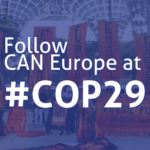In her first State of the Union, European Commission president Von der Leyen tabled a proposal for at least 55% emission cuts for the EU by 2030, up from the previous 40% target. This substantial increase in emission reductions in the short term is a welcome step provided the urgent response needed to avert dangerous climate change. However, the new target must be considered as a baseline since science requires more emission cuts, and it needs improvement to focus on real reductions.
Under the Paris Agreement, all countries have to submit new, substantially increased climate targets for 2030 by the end of this year. This timely and strong new proposal from the Commission, which still needs to be approved by the 27 Member States, should generate the international momentum needed to keep the temperature goals of the Paris Agreement in reach. We call upon the Member States to adopt and improve this proposal as soon as possible.
Despite being a welcome step forward, today’s proposal is still not in line with the latest science available. Last year, the United Nations’ Emissions Gap Report evidenced that at global level annual emission reductions of 7.6% between now and 2030 will be needed to reach the 1.5°C target of the Paris Agreement. Applying this reduction pace would require the EU to increase its 2030 target to at least 65%, and this is feasible (1). Also, the European Parliament’s Environment Committee called upon the Commission to do more and endorsed a target to reduce emissions by 60%.
While not addressed in her speech, we regret that the Commission is set to include land and forest removals in the calculation of this 55% target according to a draft seen (2). Including these removals allows big emitting sectors like industry, transport, and buildings to reduce less. This accounting trick makes it difficult to compare the current 40% target with the new target as these are calculated from different 1990 baselines. Using the same baseline as the current 40% target (which excludes removals), emission reductions under the new proposal would reach at best 53%, which is only halfway in the 50-55% range that the Commission has assessed (3).
Wendel Trio, Director of Climate Action Network (CAN) Europe said: “The Commission put forward a substantial emissions reduction target for 2030, which is a key milestone to ensure the EU can become the first climate-neutral continent in the world. But the 55% goal must be seen as a minimum baseline, as much more needs to be done to avoid dramatic climate change and its growing economic costs. Some member states already have higher goals, and so does the European Parliament. We thus believe more is possible. The higher the 2030 climate target member states will agree on, the more opportunities to create clean jobs and revive our economies.”
“EU leaders must approve a 2030 climate target that excludes removals from land use and forestry. What the world needs is real emission reductions, not accounting tricks.”
ENDS
Contact:
Nicolas Derobert, Head of communications, nicolas@caneurope.org, +32 483 62 18 88
Notes to editors:
(1) The Paris Agreement Compatible (PAC) scenario led by CAN Europe and the European Environmental Bureau shows that achieving 65% emission reductions by 2030 in the EU is feasible.
(2) The change of calculation for the 2030 climate target, included in a draft seen, still needs to be confirmed when the 2030 Climate Target Plan will be published tomorrow.
(3) Media briefing “Comparing the current at least 40% target with the new draft 55% 2030 Climate Target as proposed by the Commission”, September 2020.
Climate Action Network (CAN) Europe is Europe’s leading NGO coalition fighting dangerous climate change. With over 170 member organisations active in 38 European countries, representing over 1.500 NGOs and more than 47million citizens, CAN Europe promotes sustainable climate, energy and development policies throughout Europe.



